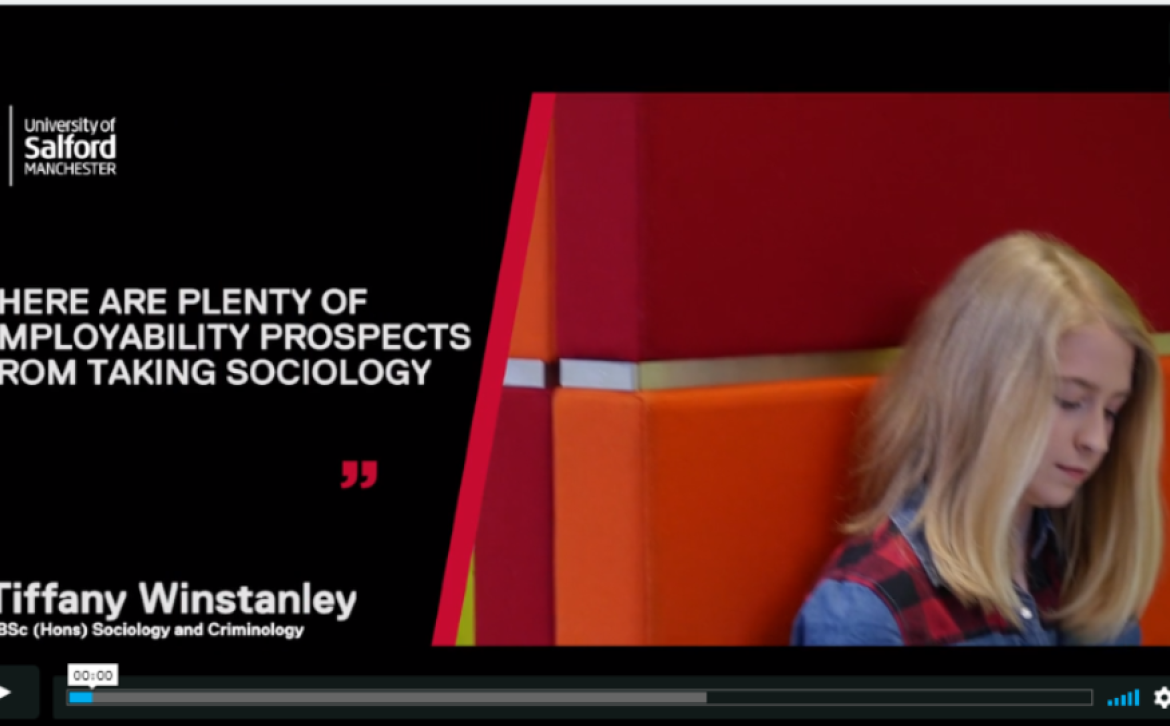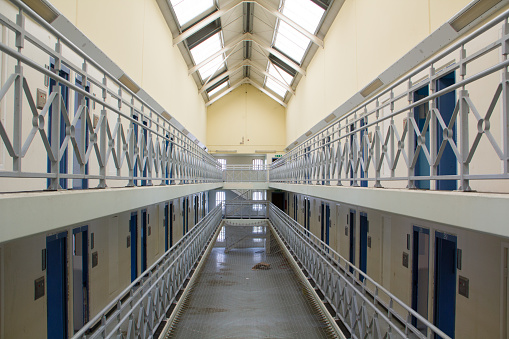Sociology at Salford
The events of 2020 have had a huge impact on our society and will do for a long time. Sociology explores the impact that these kinds of events can have, how societies deal with them and how they can be the catalysts for change in the future. If you want to study a degree that can help you to understand the society we live in, then Sociology could be for you.
Start your study journey
Register for our next Open Day to learn more about studying Sociology and speak to the course team.
What is Sociology?
Sociologists have for decades been providing answers to difficult government and policy questions, informing industry and challenging inequalities.
Sociology is concerned with understanding social life and our place within it. On this course, you will study human connections and relationships, and how these connections, as well as social structures, such as social class, race and gender, are linked to the way we behave. You will tackle difficult questions around issues such as poverty, sexism, austerity, immigration, privacy and social unrest, and gain insights into our cultural and everyday lives.
Why is Sociology currently so relevant?
2020 has been consumed by the COVID-19 pandemic, which has led to a major financial crisis, social disruption including mass lockdowns, shortages and divisions in society, unprecedented cancellation or rescheduling of major religious, political and cultural events and disruption to the education system and to our daily lives from the way we work to the way we interact with others. To accompany this, global movements such as the Black Lives Matter movement and police brutality protests have taken place across the world. Social media and the mass media have played a huge role in all these events but have both received criticism, specifically around the spread of misinformation which has raised questions around responsibility and accountability. All of these things have a huge impact on the way our societies work and develop. As a Sociology student, you will explore key historical and contemporary events such as these to understand what kind of impact they can have on society, how societies deal with them and how they can be the catalysts for major societal change.
When does this course start and how long does it take?
The next start date for this course is September 2021. This is a standard three-year degree if you study full-time. A part-time option is available which will take six years.
Where is the University of Salford?
Studying at Salford really is the best of both worlds. Our Peel Park campus is set in 46 square kilometers of lush, green space to enjoy. But we're also just over a mile away from the big city buzz of central Manchester - voted the UK's most liveable city for two years running.
Famous for music, culture, sport, art and science, the cities of Manchester and Salford offer an unrivalled student experience where you can balance your studies with world-class culture, exciting events and legendary nightlife.
If you're commuting, we have a train station that has direct links to and from Manchester Airport, Manchester Piccadilly and Victoria, as well as Blackpool, Bolton, Buxton, Blackburn, Southport, Preston, Lancaster, and Barrow-in-Furness. If you're looking to stay on campus, we're very proud to say that our Peel Park Quarter accommodation was recently voted the 2nd best student accommodation in the country by Student Hut.
What are the entry requirements?
You must have GCSE Maths and English at grade C/grade 4 or above. You must also have A-Levels, BTEC or other equivalent qualifications that equate to 112 UCAS points.
Fees
For full-time home students, the fee is £9,250. You can find out more information about paying for your degree with a student loan here.

What Can We Offer You?
In the most recent National Student Survey, 93% of students asked agreed that the course provided opportunities to explore ideas or concepts in depth (University of Salford analysis of unpublished NSS 2020 data).
We focus on providing you with industry experience and will ensure you benefit from these links, whether that be through placement opportunities, field trips, conference opportunities, surgeries, guest speakers and workshops.
In your second and third years, you will be able to tailor your course to ensure you are studying the areas of social policy that interest you the most. You will be able to do this through optional modules, placements and independent research projects.
You'll be taught by internationally recognised research-active staff who ensure that module content aligns with current social science happenings, controversies and debates.
You will have the opportunity to study a new module called ‘Inside-Out’. This module involves contact hours that are delivered inside HMP Forest Bank prison with ‘inside’ students, who are serving prisoners who will study the module alongside you.
The Inside-Out Module

Jessica Green-Howard, a third-year student, who recently finished the first run of this module gave us an insight into the Inside-Out module.
WHAT COURSE YOU ARE ON AND WHY YOU CHOSE SALFORD?
I am on the Criminology and Sociology course. Salford seemed like a great university when I attended the Open Days and the programmes seemed well run. The experience has been really good. Lectures have been great and I have developed as a person.
WHAT MADE YOU CHOOSE THE INSIDE-OUT MODULE?
I thought it would be interesting to go inside a prison and speak to people who are serving sentences. I wanted to form my own opinions about prisons from experiencing it myself and hearing the experiences of others.
CAN YOU EXPLAIN HOW THE MODULE WORKED?
We would head to Forest Bank Prison early so we had time to go through all the security, we made our way through the gates, across the yard and into the main corridor of the prison, and through to the education wing. In a classroom we sorted the chairs into a circle and waited for the ‘inside students’ to come in. Once everyone was there we began tasks and discussions.
WAS IT WHAT YOU EXPECTED?
I didn’t know what to expect, there’s not much you can compare it to, so I tried to not expect anything. I was very nervous at first, but many ‘inside students’ made effort to make me and others comfortable. They were a nice, normal bunch of guys.
WHAT WORK DID YOU DO ON THE MODULE?
We had different discussions and tasks each week, people had such a variety of opinions but no one ever got heated over disagreements and everybody would always let people speak up but they also weren’t afraid to disagree. Something interesting was always being discussed. The best moments were getting to know the inside guys: a really friendly group, with so many experiences and funny stories.
WHAT WERE THE ASSESSMENTS INVOLVED LIKE?
The assessments were challenging as I have not had to write reflectively before, but they were not completely overwhelming and we all received plenty of support. The presentation that was done in groups was especially enjoyable and done in a more fun way to present; like a game-show. Everyone had their own unique strengths so some students would be more comfortable with presenting. At the end of our tasks we were all proud of what we had managed to do individually. The best was when people got their results back, many inside students were so proud of their results, one said he couldn’t wait to ring his mum and tell her which made my day.
DID YOU FIND THE STAFF INVOLVED IN THIS MODULE HELPFUL?
The lecturers were fantastic. Antony and Kelly are very approachable, down to earth people who connected really well to both sets of students inside and outside, and they were patient, supportive and explained everything really well. They kept everyone on track really well without it feeling rushed, even though everyone agreed we all wished we could have had more time together.
WOULD YOU RECOMMEND THE MODULE TO PROSPECTIVE STUDENTS CONSIDERING ENROLLING FOR YOUR COURSE?
Yes, highly, it is an amazing experience.
Campus Life. Big City Buzz.
Study at Salford really is the best of both worlds. Our Peel Park campus is set in 46 square kilometres of lush, green space to enjoy. But we're also just over a mile away from the big city buzz of central Manchester - voted the UK's most liveable city two years running.
Famous for music, culture, sport, art and science, the cities of Manchester and Salford offers an unrivalled student experience where you can balance your studies with world-class culture, exciting events and legendary nightlife.
Campus Life
We know university life isn’t all about studying – sometimes you have to have fun, too – and there are plenty of things to do outside of academia across our campuses.
From joining a club or society, to taking part in a gym class, to meeting up with friends for lunch in Atmosphere bar and café: when you're not working on your next assignment or research project, you can be enjoying the perks of being on campus at the University of Salford.https://www.salford.ac.uk/life-on-campus
Campus Accommodation
Living in student accommodation is a great way to get settled into university life and meet new people. We've got some great accommodation options to choose from, including Peel Park Quarter - recently voted one of the best halls of residence in the UK.
Becoming an undergraduate student
Choosing a university is one of the biggest decisions you'll make - and we want to help you make the right one.

